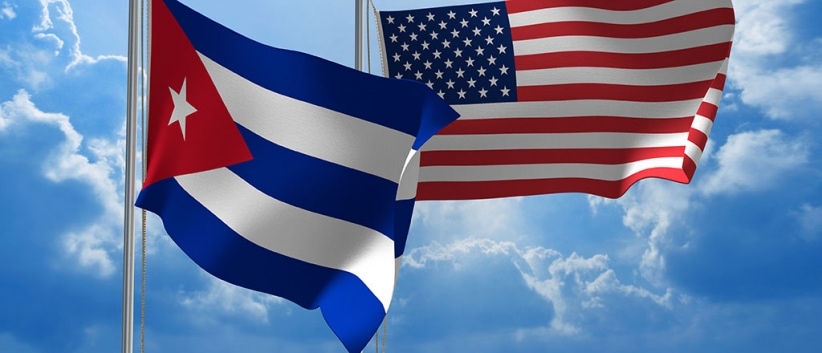
By Christian Scheinpflug
The Santiago Times Staff
For Cuba history repeats as a farce since decision-makers’ minds dissolved in a regressive ideology. Donald Trump the showman, announced a complete ‘roll back’ of US-Cuba rapprochement in an event staged as a fever dream of American exceptionalism in Miami. The participants of the play offered the usual platitudes of freedom and liberty, with Senator Marco Rubio as representative of the exiles (and target of Trumpian vile during last year’s election campaign), promising the United States would never empower the ‘oppressors’ in Havana. A home game; the crowd went crazy.
Though bursting with pathos already, Mr Trump then just added more by commending the exiles for standing up to Cuba’s dictatorship. This much pathos, unfortunately, impeded the principles of the community, because it cheered Mr Trump when he was vowing to never allow ‘communist oppression,’ although his appraisal of Communist mass murderer Kim Jong-un had raised more than one eyebrow. Pointing out Mr Trump’s esteem for génocidaires in the Philippines, Turkey, and Russia then amounts to an intrusion into the comfy world of anti-Communism.
As custom with Trumpism, lack of substance is set off by pinpointing emotions, turning foreign policy into a hostage of the Cuban exile community.The new course will keep the embassies open and travelling allowed, albeit restrictively, in groups only. These measures have been sold as a blow to the Cuban military, which engages more openly – certainly less profitable – than the US military in the economy. But since the Cuban forces’ engagement also creates employment, the policy change may well result in job losses and thus more poverty. Crucially, ’wet foot, dry foot’ won’t come back either. This scheme constituted a powerful instrument to support Cuban’s fed up with the Castro’s, as it allowed refugees – undoubtedly most of the Miami crowd – who arrived at the shores of Florida easy access to US visas. It’s hard to see how Mr Trump will thus deliver the ‘better deal for the Cuban people’ he promised without having such mandate in the first place.
The Cuban government initially responded diplomatically yet unyielding via its organ, Granma. The response called the policy change a step back and lamented the constraints on cultural exchange and business. And although the piece called out the ‘extremist minority,’ Havana struck a conciliatory tone, building a counterpoint to the extravaganza in Miami. Cuba’s politburo addressed the 75% of US citizens that favour rapprochement and vowed to keep striving toward friendly relations on all levels. This suggests, somewhat comically, that the Cuban politburo may have a better idea about the wants of ‘the American people.’ The Cuban government lamented furthermore Mr Trump’s equating the Cuban people with the Cuban military. This signals that Havana seems genuinely concerned to keep both realms apart, otherwise it would just have mimicked the US approach and glorified the bond between ‘the people’ and ‘our troops.’
The Granma piece even mentioned essential socio-economic reforms in Cuba. Though largely ignored by the international media, this is significant as it displays a reason for the politburo’s ability to hold onto power: Contrary to the GDR’s gerontocracy, which uttered ‘change’ only when terminal demise set in, Cuban communists seem to embrace the arrival of capitalism. They just want to do so on their terms, hence the repeated insistence on ‘sovereignty.’ And who could blame them after the sudden Chicago Boys-invented shock therapy ravaged popular power throughout Latin America in the 1970s, devastating also East Europe and Russia in the 1990s? No contemporary conscientious leader would want to invite such catastrophe.
Past events, however, must not cloud present thinking. Proponents of the new Cuba policy portray the change as a ’smart move’ but forget that Mr Trump isn’t a smart politician (he doesn’t even get the importance of his daily intel briefings), he’s a conman. Critics of the policy reversal, on the other hand, point out that 60 years of the old embargo failed and so will the new one. But this is not the Cold War-order anymore. In this context, success or failure of a US policy become less relevant than impact.
Washington, while retaining much clout, won’t wield as much influence as it did in the past, a result partly of its own design. Nor is China as economically impotent or Russia as timid as they once had been. Indeed, Moscow quickly solidarised with Cuba, which looks like part of a bold strategy to make inroads into Latin America, considering trade deals with Colombia and the strengthening the bond with Chile. China, too, has courted Chile as a springboard into the region, and vigorous investment policy in Argentina together with the canny move to determine Panama’s Asia policy prove that Beijing is jumping in. Rather sooner than later both countries will tap into the Cuban tourist industry, invest in its agriculture to secure food resources, and utilise Havana’s political leverage.
Latin American leaders, too, should seize the moment and intensify relations with Cuba as long as the US remains stuck in yesteryear’s rhetoric and populism. After all, tragic farce contains historic opportunity as well.



